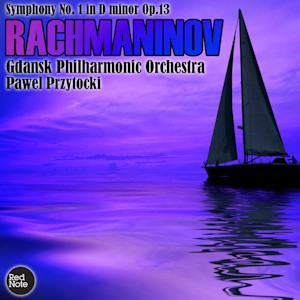
Sergei Rachmaninov (1873-1943)
Symphony No.1 in D minor Op.13 (1895)
Philharmonie de Gdańsk / Paweł Przytocki
rec. 1991, no location given
Review of ONYX Classics 66572
Red Note [43]
I came across this disc on Ebay, on a defunct Dutch budget label ONYX Classix (not to be confused with Onyx Classics). (Note – in accordance with MWI’s purchasing rules, the header is from a currently available release. The original issue was on the Denon label).
I love Rachmaninov’s First Symphony. I regard it as his most original utterance. Over the years, I have developed fixed preferences about how it should be performed, especially the last movement. The original score is lost, and Rachmaninov never got around to revising the work after its crushingly bad reception, so it has had to be reconstructed from orchestral parts.
There are two opposite poles of interpretive stance. The coolly objective type is exemplified by Dmitrij Kitaenko and the Gürzenich-Orchester Köln (review). For the no-holds-barred type, reaching out to every excess of emotional pull, look to Yevgeny Svetlanov in his two Russian recordings.
The symphony is a young man’s work, full of emotional extremes. If a conductor tries to re-interpret it from a middle-aged, rationalist standpoint, they take the risk of partially neutralising the piece and diluting its impact. Kitaenko does just that, and succeeds in making the work boring, despite the superb recording and fine orchestral playing.
I make no secret of my preference for the Svetlanov school. Technically, Svetlanov’s first recording for Melodiya in 1966, remastered on Alto (review), is a typical Soviet effort of the period, harsh, upfront and barely able to cope with the intense climaxes the conductor conjures up. But the effect of the performance is so overwhelming that I can easily forgive the technical shortcomings or the engineering, which I seldom do.
Its successor is part of a set of Rachmaninov’s symphonies (review), in much better sound. The orchestra still sports the authentically raucous brass, but Svetlanov has become a little more mannered in his interpretation. Even so, the lead-up to the final coda is tremendously exciting, and the coda is crushing in its doom-laden effect: no gentle stroking of the tam-tam here. Like the earlier version, the performance demonstrates totally committed music making!
Paweł Przytocki, it turns out, is a respected Polish musician with just a few recordings to his name. He has guest-conducted throughout the EU, and is now the principal conductor of the Arthur Rubinstein Philharmonic in Lódź. One can find a brief, and too enthusiastic, mention of this recording online. Made in 1991, it does not demonstrate the highest class of sonic splendour; it has a fairly typical edge to the string tone, typical of many early digital efforts. The acoustic is quite reverberant, so low tympani are occasionally muffled. All the same, it is perfectly decent. (No recording location is given, but it may have been the Polish Baltic Philharmonic Hall in Gdańsk.) There is no booklet, just track timings and the movement tempo markings.
The performance itself, very fine, shows a well-judged balance of lyricism and drive. The impression sometimes is that the orchestra is not particularly large. (The website lists about 85 members, but that may bear no relation to the numbers in 1991. The first movement is straightforwardly done, with good contrast between loud and quiet sections. The Mendelssohnian scherzo is suitably sprightly. The third movement, with one of Rachmaninov’s most beautiful tunes, it is not presented in the same hyper-emotional way he evinces in the E minor symphony. There, the effect of saturated strings rising to higher and higher levels of emotional outpouring is replaced by a much cooler presentation, very beautiful nonetheless. Unfortunately, the composer interrupts the flow by re-introducing a gloomy recollection of the first movement motto theme, which gets nowhere and is rather boring.
In many ways, the performance of the last movement can make or break the whole interpretation. Przytocki starts out with a spiritedly impactful rendition of the opening martial passage, one of Rachmaninov’s most memorable creations. The excitement is well maintained – a hectic ride into an all-engulfing abyss – and it becomes quite edge-of-seat as the culmination approaches. The music hurtles to a climax. Unlike some other recordings, there is no moment of silence followed by a gentle stroke on the tam-tam. Instead, we have an instantaneous crash on the instrument, allowed to reverberate in a satisfying manner. The coda is a darkly ominous affair in the lower reaches of the orchestra. I am pleased to say that, as it grinds to its crushing close, the apocalyptic effect is much enhanced by very audible repeated, thrilling tam-tam strokes. My only criticism is that the tam-tam is not quite deeply toned enough; a larger instrument would have been better.
In summary, this is a very fine performance, not quite as well recorded as it might have been. It is well worth its low price.
Jim Westhead
Availability: Qobuz


















